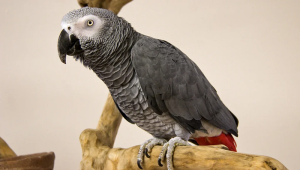Wildlife experts have cautioned that the ecosystem services provided by African Grey Parrots are at severe risk if urgent action is not taken to stop the current trend that threatens their existence.

The stakeholders expressed regret that, because of their intellectual characteristics, particularly their capacity to mimic people, the bird has become a highly sorted-out species worldwide as a pet, for traditional medicine, and for food, hastening its disappearance.
According to them, research in Nigeria has proven that the rate of the pet trade is frightening and impacts their population more than anything else. As a result, they believe it is essential that key actors work together to conserve these species and help solve the issue of global warming.
“So that it doesn’t become a case of a species that we cannot see anymore,” says Festus Iyorah, Nigeria’s representative of the Wild Africa Fund.
Iyorah, who made the statement on Friday, October 20, 2023, during an airspace engagement on Twitter, said if this animal disappears and can’t be seen again, it’s going to be a sad story because “I will show my children or grandchildren the picture of the African Grey Parrot instead of them seeing it themselves.”
The Twitter session was organised by Wild Africa Fund in collaboration with the Nigeria Conservation Foundation (NCF) and EnviroNews Nigeria.
Iyorah called for the regulation of a wide variety of human activities, including habitat destruction, online trade, and the sale of their parts in the wildlife market, to guarantee their protection.
African Grey Parrots are known as forest gardeners because of their tendency to encourage afforestation, which helps in mitigating the effects of global warming, according to Ifeanyi Ezenwa, Nigeria Coordinator of the World Parrot Trust (WPT).
This, he asserts, is accomplished by their feeding behaviours, in which they take what they eat and defecate it elsewhere.
“In doing this, they tend to plant the trees that they feed on in different places, and that is why they are called forest gardeners,” the WPT coordinator stated, emphasising their contribution in assisting to sequence carbon, which is one of the greenhouse gas emissions that is responsible for global warming.
He continued by pointing out that it is fundamental that these birds be preserved in their natural habitat in order for them to perform essential ecosystem services by making sure that the environment is conducive to life.
However, if this bird is no longer present, the nation would face challenges, he warned, because global warming is threatening in various regions and their “activities are more important than any economic value in general.”
In the same vein, Dr. Stella Egbe, species conservation manager at the Nigerian Conservation Foundation (NCF), stated that in addition to dispersal, these parrots serve an important role in making food available to humans because some of the fruits they feed on are also food for humans.
She decried that because the deforestation rate is faster than the regeneration rate, Nigeria is also losing its indigenous species that serve as food for its people.
The conservation specialist went on to elaborate that parrots are the ones that help to replenish the natural ecosystem, and if they disappear, the implication is that the country has to pay for these things and wait for a long time to regenerate.
“So by losing parrots, we also lose the important role that they play in the ecosystem,” Dr. Egbe informed.
The discussion, which focused on the ecological importance of African Grey Parrots, why they are disappearing, and what steps can be taken to save them from extinction, concluded with the participants acknowledging that there are many dynamics at work in the parrot population in Nigeria, and they must all be addressed as effectively as possible.
By Etta Michael Bisong, Abuja
